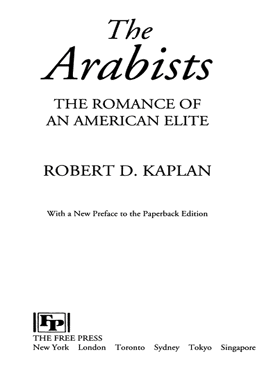The Arabists

Copyright 1993, 1995 by Robert D. Kaplan
All rights reserved. No part of this book may be reproduced or transmitted in any form or by any means, electronic or mechanical, including photocopying, recording, or by any information storage and retrieval system, without permission in writing from the Publisher.
The Free Press
A Division of Simon & Schuster, Inc.
1230 Avenue of the Americas New York, N.Y. 10020
www.SimonandSchuster.com
First Free Press Paperback Edition 1995
Printed in the United States of America
printing number
7 8 9 10
Library of Congress Cataloging-in-Publication Data
Kaplan, Robert D.
The Arabists : the romance of an American elite / Robert D. Kaplan.
p. cm.
Includes bibliographical references (p. ) and index.
ISBN 0-02-874023-8
ISBN-13: 978-0-028-74023-2
eISBN-13: 978-1-439-10870-3
1. Arab countriesForeign relationsUnited States. 2. United StatesForeign relationsArab countries. 3. United States. Dept. of State. Bureau for Near Eastern and South Asian AffairsBiography. 4.OrientalistsUnited StatesBiography. I. Title.
DS63.2.U5K35 1993
327.730174927dc20 93-4321
CIP
For my wife MARIA and my son MICHAEL
Contents
Preface to the Paperback Edition
Since the writing of The Arabists, the Balkan crisis has continued to unfold, adding further perspective to events elsewhere in the Near Eastthe setting for The Arabists.
The Iraqi invasion of Kuwait and the Serbian conquest of Bosnia, it is now clear, were the two signal crises of the post-Cold War era. They occurred back to back in the lands of the former Turkish Empire, whose postimperial pathologies burden us still. The two crises are eminently comparable. But how different have been the responses of State Department area specialists to those two aggressions and to the weak White House policies toward both Seriba and Iraq!
Comparison improves scholarship. The policies of the Bush and Clinton administrations toward Serbian aggression in the former Yugoslavia, as unsatisfactory as they were (and have been), are still more defensible than the response of the Reagan and Bush administrations to the provocations of Iraqi dictator Saddam Hussein prior to his August 1990 invasion of Kuwait. After all, Serbian President Slobodan Milosevic, as awful as he is, was not building nuclear or chemical weapons as Saddam was. And the Serbian-run ethnic cleansing camps constituted an atrocity no worse than Saddams gassing to death of thousands of Iraqi Kurds. Moreover, because of the mountainous terrain and complex military alliance system of the former Yugoslavia, American military intervention against Serbia has always been less feasible than decisive active against Iraq.
Nevertheless, such mitigating factors did not stop three Foreign Service officers from the State Departments Bureau of European Affairs, and one civil servant from States Bureau of Intelligence and Research, from resigning in protest against White House appeasement of the human rights abuses of Serbias Milosevic. Balkan war crimes unleashed an unprecedented upheaval in the European Affairs bureau. Arguments broke out. Details of human rights abuses on a scale of what had occurred in Iraq caused serious crises of conscience. Foreign Service officers and others dealing with European affairs were willing to give up their careers and financial security purely in defense of a principle. Faced with a spineless policy emanating from both the White House and the secretary of states office, these State Department officials did not always carry out orders, agree with those from other agencies, and afterwards place the blame and responsibility on higher-ups.
Contrast this with Foreign Service officers dealing with Iraq. No one resigned. Protest against the Bush Administrations coddling of Saddam was low key or nonexistent. There was no identifiable revolt, as there was among Europeanists regarding Bosnia.
Why?
This book may give part of the answer. But another has occurred to me since the hardcover version of The Arabists was published:
Human rights crimes in the Balkans caught Europeanists after the end of the Cold War. Stripped of the old paradigms, they operated in a chaotic climate in which new ideas could emerge, since no one was sure what the ground rules were now. This is a climate that fosters revolt, a climate in which a young officer feels little inhibition about challenging a secretary of state.
The Arabists, such as Ambassador to Iraq April Glaspie, were operating in a less congenial climate for ideas: locked into a lateand calcifyingphase of the Arab-Israeli conflict, before Israel made treaties with the Palestine Liberation Organization and with Jordan. This was a historical phase of hard, old truths, which does not exactly favor self-doubt, self-questioning, and intellectual challenges from the ranks. I just wonder how the Arabists would have reacted if say, the Iraq crisis was brewing after Israel had made a comprehensive peace with several Arab states. I think there might have been less unanimity in such a circumstanceperhaps even a revolt.
In a carefully documented study of U.S. policy leading up to Saddams invasion of Kuwait, done for the Kennedy School of Government at Harvard University, Zachary Karabell shows how Miss Glaspies thinking was of a piece with the ideas of many others in the higher reaches of government, including the National Security Council and the Central Intelligence Agency. This aspect of the affair is surely noted in The Arabists, but it is not given sufficient emphasis. My story represents one angle of vision; there are others.
This text is slightly revised from the hardcover edition. A number of errors of fact have been corrected. Ideas that occurred to me since the hardcover appeared have been added. A book, like life, is a work in progress.
Preface and Acknowledgments
As with my previous books on Ethiopia, Afghanistan, and the Balkans, this one began as a magazine article for the Atlantic Monthly, under the editorial guidance of Cullen Murphy and with the advice and support of Bill Whitworth. However, this book is no mere extension of the article Tales from the Bazaar, which ran as a cover story in the August 1992 issue of the Atlantic. That piece was a horizontal exercise, where I meandered on a flat plane from personality to personality, giving the reader a taste of the subculture of State Department Arabists. This book is a vertical projectthat is to say, historicaland, therefore, ultimately more critical. Though large sections of the article have been adapted for use in this book, especially in the later chapters, even those parts contain much additional information that has influenced my conclusions.
This is neither pure history nor pure journalism but a mixture of both. I have tried to see various individuals in terms of the historical and social milieu in which they were fated to work. I could sleep a lot easier had I been able to make everyone in this book appear a hero. Unfortunately, that has not been possible since it would have involved a complete suspension of judgment on my part. However, I am still in some awe of Arabists as a group of unambiguous, nation-state Americans, for whom patriotism is a more clear-cut enterprise than it is for those of my own Vietnam-age generation. I have, therefore, tried with all my heart to be fair. And being fair, in this case, means presenting information in its proper context. Thus, as regards my analysis, I make no apologies.
Next page













